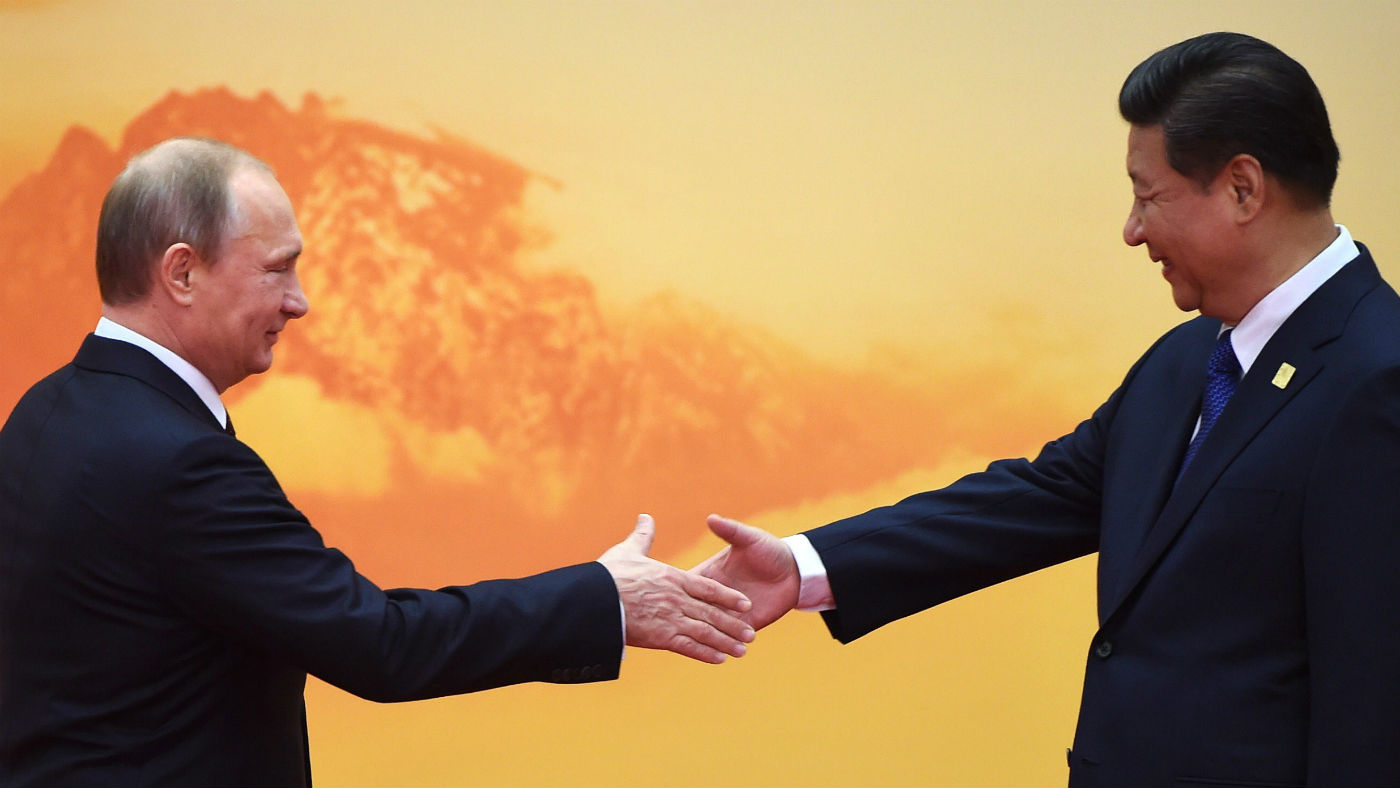Russia-China: the new world order
Former communist rivals look to forge closer ties under autocratic rulers

A free daily email with the biggest news stories of the day – and the best features from TheWeek.com
You are now subscribed
Your newsletter sign-up was successful
Russia and China will look to cement their burgeoning partnership and growing influence on the world stage when their leaders meet later this year.
After his landslide election win, Vladimir Putin will travel to Beijing in June to meet his Chinese counterpart, Xi Jinping.
Xi visited Russia last year and has since pushed through changes to China’s constitution abolishing term limits and effectively making him leader for life.
The Week
Escape your echo chamber. Get the facts behind the news, plus analysis from multiple perspectives.

Sign up for The Week's Free Newsletters
From our morning news briefing to a weekly Good News Newsletter, get the best of The Week delivered directly to your inbox.
From our morning news briefing to a weekly Good News Newsletter, get the best of The Week delivered directly to your inbox.
Russian state media says the visit will build on a promise made by the two leaders during last November’s Asia-Pacific Economic Cooperation (Apec) meeting to enhance bilateral ties and co-operation on international affairs.
“Noting that China and Russia have firmly supported each other in safeguarding their core national interests, and further strengthened political mutual trust, Xi said the two countries are strategic partners that have truly placed trust in each other,” China’s state-run Xinhua news agency reported at the time.
Areas of increased co-operation are likely to include the development of a free trade agreement for the Asia Pacific region, as well as increased bilateral trade in the fields of energy, investment, technology, aviation, aerospace and infrastructure.
A closer alignment of security objectives, particularly in promoting so-called cyber sovereignty - to counterbalance to what is seen as increasingly bellicose behaviour from the US, Nato and Japan - is also expected.
A free daily email with the biggest news stories of the day – and the best features from TheWeek.com
Following Western sanctions in the wake of Russia’s invasion of Crimea, Beijing upped its economic support for Moscow, “and both countries have long supported each other at the United Nations on issues such as North Korea and Syria, where they are in opposition to or disagreement with the US”, says CNN.
At a meeting at the UN in September, foreign ministers from both countries criticised Washington’s aggressive stance and said the world was moving away from being dominated by a single superpower and transitioning towards a more “multipolar world”.
It has not gone unnoticed that June’s meeting will be held in conjunction with a gathering of the Shanghai Cooperation Organization (SCO), “which is a major part of that multipolarity”, according to CNN.
The broadcaster says the SCO - which includes China, Russia, Kazakhstan, Kyrgyzstan, Tajikistan, Uzbekistan, India and Pakistan - “has been compared to an eastern Nato, and is designed in part to counterbalance western influence in Asia and the Middle East”.
Dmitry Kosyrev, writing for the Kremlin-backed website Sputnik, says that Donald Trump’s protectionist trade policies have forced globalists in the West to admit “defeat by recognising that neither Russia nor China will dance to their tune”.
But Robert Kaplan in The Wall Street Journal has a word of warning for those who predict the unstoppable rise of a world increasingly dominated by a Russian-Chinese duopoly.
He argues that explosions of middle-class wealth and technological advancement are putting pressure on governments to be more alert to the needs of their citizens.
“The thought controls the Chinese regime is attempting to place on its own people will work for now,” he says. “But the ultimate result will be more psychosis, repression and anxiety on the individual level. From this new social explosions will ultimately emanate”.
-
 Local elections 2026: where are they and who is expected to win?
Local elections 2026: where are they and who is expected to win?The Explainer Labour is braced for heavy losses and U-turn on postponing some council elections hasn’t helped the party’s prospects
-
 6 of the world’s most accessible destinations
6 of the world’s most accessible destinationsThe Week Recommends Experience all of Berlin, Singapore and Sydney
-
 How the FCC’s ‘equal time’ rule works
How the FCC’s ‘equal time’ rule worksIn the Spotlight The law is at the heart of the Colbert-CBS conflict
-
 Putin’s shadow war
Putin’s shadow warFeature The Kremlin is waging a campaign of sabotage and subversion against Ukraine’s allies in the West
-
 Alexei Navalny and Russia’s history of poisonings
Alexei Navalny and Russia’s history of poisoningsThe Explainer ‘Precise’ and ‘deniable’, the Kremlin’s use of poison to silence critics has become a ’geopolitical signature flourish’
-
 The fall of the generals: China’s military purge
The fall of the generals: China’s military purgeIn the Spotlight Xi Jinping’s extraordinary removal of senior general proves that no-one is safe from anti-corruption drive that has investigated millions
-
 What happens now that the US-Russia nuclear treaty is expiring?
What happens now that the US-Russia nuclear treaty is expiring?TODAY’S BIG QUESTION Weapons experts worry that the end of the New START treaty marks the beginning of a 21st-century atomic arms race
-
 Epstein files topple law CEO, roil UK government
Epstein files topple law CEO, roil UK governmentSpeed Read Peter Mandelson, Britain’s former ambassador to the US, is caught up in the scandal
-
 Iran and US prepare to meet after skirmishes
Iran and US prepare to meet after skirmishesSpeed Read The incident comes amid heightened tensions in the Middle East
-
 Israel retrieves final hostage’s body from Gaza
Israel retrieves final hostage’s body from GazaSpeed Read The 24-year-old police officer was killed during the initial Hamas attack
-
 China’s Xi targets top general in growing purge
China’s Xi targets top general in growing purgeSpeed Read Zhang Youxia is being investigated over ‘grave violations’ of the law